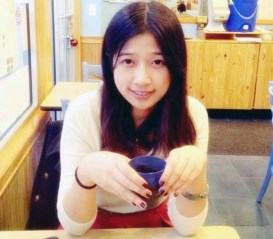People gather with candles during a vigil for 8-year-old Martin Richard, who was killed by an explosion near the finish line of the Boston Marathon, at Garvey Park in Boston on April 16, 2013
UPDATED
Lu Lingzi chose the English name Dorothy for herself, a fitting moniker for an adventurous young woman who was transported from rust-belt China to the U.S., where she was pursuing a master’s degree in mathematics and statistics at Boston University. On April 15, Lu hovered at the finish line of the Boston Marathon to cheer on classmates who were competing. She was one of three people killed by the twin blasts that turned the Patriots’ Day race into a scene of devastation. A fellow Chinese graduate student at Boston University, who was with Lu at the finish line, sustained serious injuries.
(PHOTOS: The Aftermath of the Boston Marathon Explosions)
Reared in the grimy northeastern city of Shenyang where she attended a special school for talented youth, Lu made her way south to Beijing for college, where she studied international economics and trade at the prestigious Beijing Institute of Technology, ranking eighth in her major, according to her online CV. While in her final year of college, she interned at Deloitte in Beijing. After graduation, Lu joined the roughly 200,000 Chinese students who study in the U.S. “She was very lovely and full of positive energy,” says Gong Zheng, a friend who met Lu when they used the same Beijing agency to help them with their study-abroad applications. Gong, who is now studying in Atlanta, says Lu belied the common image of Chinese students in America as being spoiled, rich brats who buy their way into academic institutions. “She and I are kids from ordinary Chinese families,” Gong says. “We just wanted to get a better future through our own hard work.” He adds that Lu “liked to use mathematics to solve problems.”
(MORE: Who’s Behind the Attack? Tracing Some Initial Clues)
Starting at Boston University last fall, Lu posted pictures on Facebook that described her “New Beginning in BU.” According to her Facebook profile, her likes ranged from Disneyland and Sephora beauty products to Lindt chocolate and the Economist magazine. Shortly after arriving in Boston, Lu posted a picture of traditional northern Chinese comfort food, porridge of mixed beans and grains. Was it a measure of homesickness or simply delight at being able to recreate this traditional dish in a faraway land?

Lu Lingzi
In an e-mail to TIME, Zhang Xuejiao, a middle-school classmate of Lu’s who is currently studying at Carnegie Mellon University, wrote of the pressures many Chinese students are under while in the States: “People in China, when they hear we are in America, they may only think about how great our lives are here, but they don’t know how hard we have to study. They don’t think about how we have to stay up every night to finish our homework. They don’t think about how great are the responsibility and expectations we have to carry.”
As news filtered out in China of Lu’s death, the reaction on Weibo, the Chinese social-media service, was swift. Barely an hour after Xinhua, China’s state media, confirmed that an unidentified Chinese student had been killed by the Boston bombs, more than 500 people had posted digital candles in her honor on Weibo. By the afternoon of April 17, more than 8,000 had so honored Lu. Earlier, the death of 8-year-old Martin Richard in the Boston explosions had also galvanized the Chinese Internet community, which poured out sympathy to his family. (Krystle Campbell, a 29-year-old restaurant manager, is the other confirmed fatality.)
Politics, though, is never far from the surface on Weibo, which remains the only way in which ordinary Chinese can express themselves in China’s tightly monitored public sphere. (Weibo is controlled by state censors but some information manages to get through.) Commenting on Chinese state broadcaster CCTV’s extensive coverage of the Boston tragedy, Weibo users wondered why fatal explosions in China have received scant scrutiny from Chinese media. The Chinese government is obsessed with maintaining stability and often obscures volatile events that might cause further unrest.
(MORE: After Boston Bombings, World Reacts With Flood of Tributes)
CCTV was also criticized for its flexible definition of who counts as one of its reporters. Among the 30 or so mainland Chinese competing in the Boston Marathon was real estate tycoon Wang Shi, who witnessed the explosions and posted several pictures of the mayhem. CCTV aired the photographs, calling one of China’s most famous businessmen “our journalist.” Wang, who was racing in Boston with 14 other employees of his China Vanke Co., fired back on Weibo: “When did I become a journalist?”
As for Lu, her Weibo postings often revolved around her pet dog and enthusiasm for food. She described the wonders of Western food, like Ben & Jerry’s ice cream, waffles and roast beef with mushrooms. Her last post was on the morning of the marathon. “My wonderful breakfast,” she wrote in English, next to a picture of Chinese bread, fruit and vegetables.
— With reporting by Gu Yongqiang and Chengcheng Jiang / Beijing

